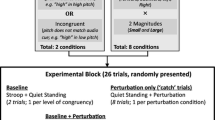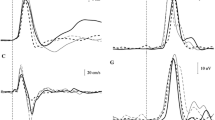Abstract
Recent research suggests that the balance requirements of a task dictate the reflexive response. However, these observations were inferred indirectly from either different tasks or different phases of the same task. This study directly tested the hypothesis of balance-dependent control during recovery from an unexpected trip. The subjects were tripped in two different support conditions: unilimb support (provided by the stance limb) or trilimb support (provided by the stance limb and both arms placed on adjacent parallel bars). The subjects exhibited anticipatory changes: they biased the body center of mass toward the support limb in the mediolateral direction and elevated the swing limb higher when there was a possibility of being tripped. The electromyographic (EMG) latencies were not influenced by the threat to equilibrium. The magnitudes of the EMG reflexive response to the trip were clearly modulated as a function of the threat to stability, not in a simple manner, but rather in a complex manner, which optimized the recovery strategy. It is evident that the overriding concern, equilibrium control during locomotion, has a dominant influence on reflex modulation.
Similar content being viewed by others
Author information
Authors and Affiliations
Additional information
Received: 2 July 1996 / Accepted: 3 November 1997
Rights and permissions
About this article
Cite this article
Rietdyk, S., Patla, A. Context-dependent reflex control: some insights into the role of balance. Exp Brain Res 119, 251–259 (1998). https://doi.org/10.1007/s002210050339
Issue Date:
DOI: https://doi.org/10.1007/s002210050339




